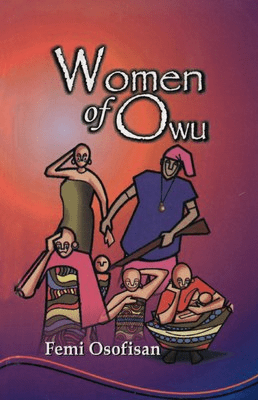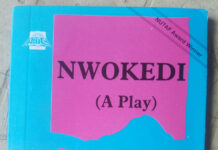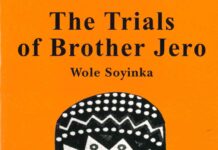📢 Follow our WhatsApp Channel for the latest literary updates!
The characters in Femi Osofisan’s famous play, Women of Owu, include Erelu, Gesinde, Anlugbua, Lawumi, Orisaye, Okunade, Adumaadan and Iyunloye.
Erelu Afin
Erelu Afin is the protagonist of the play. She is the wife of Oba Akinjobi, the reigning Olowu of Owu Ipole. She is the queen of Owu and a mother of five sons and two daughters.
She typifies the Owu’s rank and file brought to its knee by the defeat of Owu. She is the vestige of Owu royalty and the women report to her and look up to her for guidance and direction.
She leads the procession of the grieving women of Owu. She is in fact summoned by the women to serve as a medium between their ancestral god and them. She becomes possessed by the spirit of Anlugbua and communicates to them the words of the god.
Erelu loses heavily to the war. She loses her seven children, a grandson and her husband to the war.
Erelu is partly responsible for the cruel fate and woes that beset Owu Kingdom. At birth, it was divined that her son, Prince Dejumo, was ill-fated and would bring disasters to the Owu people. Yet, Erelu kept, weaned and raised the child. Perhaps, Owu might have met a different fate if the child hadn’t been spared to live.
But can Erelu be blamed for what she did out of her motherly instinct, care and love? Not many women would have done otherwise if put in her position. Not many would have tamed their emotions to do what was right.
Can she be blamed for keeping Dejumo? Besides, she tries to remedy her error with her advice to Iyunloye while the war was hot to return to Okunade and save Owu from the dark cloud hung over the kingdom.
However, one noticeable trait of Erelu Afin is her blame game. She shifts blame as to who is responsible for the fall of Owu. Instead of admitting the role she played in the ruination, she blames Iyunloye for the destruction of Owu.
Like the other women, Erelu is shared as part of the spoils of war. She is meant to be given to Balogun Derin who intends to gift his wife as servant. But as predicted by her half-mad daughter, Orisaye, she rather dies on Owu soil after delivering Anlugbua’s message to her people.
Erelu’s descent from grace to grass demonstrates that when calamity strikes a people, it doesn’t discriminate; it strikes even regardless of one’s status.
The Erelu Afin projected in Women of Owu is caring but bitter; grieving but defiant. She has lost faith in the gods but still manages to be the vehicle through which Anlugbua’s message is relayed to her people.
Orisaye
Princess Orisaye is the half-mad daughter of Erelu Afin and Oba Akinjobi. She has been a votary of Obatala, the god of purity and creativity, from birth. Part of being wedded to Obatala involves being a virgin for life.
Unfortunately, Balogun Kusa, a commander of the allied forces and protege of Ogun, takes Orisaye as part of his war booties with the intent to induct her into his harem of wives.
Before she is taken into the tent of Kusa, Orisaye makes three prophetic statements:
- The allied forces will encounter difficulties on their way home. A lot of them will not find their way home.
- Her consummation of marriage with Balogun Kusa will usher in the death of Balogun Kusa and later, her.
- Her mother, Erelu Afin, will die on Owu soil and be saved the ignominy of being a slave to Balogun Derin.
That these prophecies come to pass shows that contrary to the belief of Erelu and the other women, Orisaye is in her right senses while uttering these words. She is also portrayed as one with the gift of vision, an attribute which is not unconnected with her spiritual bond with Obatala.
Orisaye will later kill Balogun Kusa in revenge for the latter’s destruction of Owu and his effrontery to claim Obatala’s votary for wife. She will also be killed for her murder of Kusa.
Orisaye is very determined. She is that kind of person who doesn’t stomach nonsense and defends her dignity and that of her people even in an unfavourable circumstance. This, she shows in her defence of her mother when Gesinde in a remarkably ridiculing way says Erelu will enjoy being the servant of Balogun Derin’s wife. Orisaye rains brimstones of invectives on him for his condescending jibe:
“May a thousand termites eat your mouth for that word,
— Orisaye (Page 31)
You insolent Ijebu dog! Servant!
Is it my mother you dare address like that!
You murkier than the murkiest maggot in the street
Of leftovers!”
Women of Owu.
She will go on to tell Gesinde that her mother will die on Owu soil.
Iyunloye
Iyunloye is the former wife of Okunade, taken captive by Owu warriors led by Akogun Awalona at Apomu market. She is given in marriage to the king’s son, Prince Dejumo.
She is one of the two reasons the allied forces advance against Owu. Okunade, a former artist, joins the military primarily to exact his vengeance against the Owu people and claim Iyunloye.
When confronted by the wrath of Mayé Okunade, Iyunloye plays the victim. She claims it is not her fault that a woman made the unfortunate decision to keep a child who was cursed to bring misfortune to everyone; that she was captured at Apomu market.
Her justification for her continued stay in Owu contrasts Erelu’s claims. It is therefore not easy to decide the veracity of the claims. But one thing is clear: Iyunloye is a woman with wiles to manipulate and mesmerise any man.
She has the looks, the brain and the cunningness. It is least surprising that the Mayé finds it difficult not to look at her even when he has been warned not to inorder not to be swayed by her looks.
By the end of the play, it is obvious that whatever punishment the Mayé has designed for her will not see the light of the day. She has managed to find her way into his heart and sweet-talk him into allowing her into his tent.
Iyunloye is an example of the capability of women to bring a nation to its ruins. On the overview, Iyunloye is perceived as a wily beautiful young woman and perhaps, a chronic liar.
Gesinde
Gesinde is an Ijebu officer in the allied forces. He functions as the information officer from the allied forces to the women of Owu. He is some kind of liaison officer between the conquerors whose interests he represents and the conquered.
Gesinde relays information and instructions from his generals to the women. This places him in an important position and allows him to be rude to women who before now are nobility themselves.
It is Gesinde who informs the women of their fate. He particularly tells Erelu Afin of Balogun Derin’s decision to make her his wife’s servant. It is he who also conveys the decision of Balogun Kusa to marry Princess Orisaye, Obatala’s votary. He is also the one who informs the women of the capture and killing of King Akinjobi and his chiefs.
He is also vested with the power to carry out ignominious errands on behalf of the generals. One is the smashing of Aderogun’s head against a tree.
Gesinde does not feel comfortable with the gory killing of the innocent child but duty is duty. Simply put, Gesinde is like a dog who must obey its master. In his words, “the generals sit back and give orders. But it’s we poor ones who have to face the victims and spill the blood . . . I am a soldier and must do my duty.” (Page 45)
This is not to say Gesinde does not have opinions of his own. He is for example baffled about how his superiors think. He still can’t find justification for Balogun Kusa’s decision to marry Princess Orisaye, a half-mad woman, when there are a lot of beautiful damsels to pick from.
There is no denying the monstrous being Gesinde is transformed into by his role. Erelu calls him “man of misfortune”. However, he is considerate and still has some residues of sympathy and compassion in his heart. There are two instances of this. Firstly, he warns the women against committing suicide when it appears there might be something like that. This is him protecting his job but then it shows he is human after all.
Secondly, he allows Erelu and the women some minutes and space to bid each other goodbye. The women are able to utilise the time to consult Anlugbua. This would not have been possible if Gesinde had not spared them the needed time and space. This portrays him as considerate.
Adumaadan
Adumaadan is the widow of Lisabi, the first son of Erelu. Her little infant, Aderogun, meets a cruel death in the hands of the allied forces. The boy’s head is smashed against a tree.
Adumaadan mourns both her husband and son.
She blames her mother-in-law, Erelu, for being responsible for what happened to her and Owu. Adumaadan claims that Erelu Afin’s choice to keep Prince Dejumo and pamper him with care she did not spare for Prince Lisabi is the undoing of them all. She affirms that her mother-in-law never loved Lisabi, her husband.
Adumaadan loves her husband so dearly that she is concerned that when touched by another man from the fold of her husband’s killers, her body will betray her and yield to the killer’s touch.
Mayé Okunade
Okunade is the Mayé of the Ife army. As an Ife war leader, he gets the opportunity to exact his vengeance when Owu fell into the hands of the allied forces.
Before joining the military, Okunade was a very skilled sculptor who realised the powerlessness of his profession. He plies his trade in the military when his wife is captured by Owu army.
Apart from punishing the Owu people, he also intends to punish Iyunloye for her infidelity. However, he is incapable of doing so because, as Erelu notes, the love for Iyunloye is still very much strong in his heart.
In the end, he is swayed by the beautiful looks and sweet tongue of Iyunloye into taking her back into his fold.
Anlugbua
Anlugbua is the deified Owu war leader. The son of Oba Asunkungbade, Anlugbua is worshipped as the ancestral god of Owu.
He comes back to see Owu in its ruins. He asks around to be sure the rumble is where Owu used to be. He in turn questions the women whom he interviewed on why he was not called upon when they came under attack as he had instructed them to in such circumstances.
Anlugbua will later find out the reason Owu is ransacked and reduced to rumble from Lawumi, his deified grand mother. He pleads with her to have mercy on Owu. He also obliges to the goddess’ request for him to help punish the victory-drunk allied forces for their desecration of the gods’ shrines.
At the end of the play, Anlugbua raises the issue of the validity of the recorded history of the gods. He claims each of the gods, contrary to their exultation in the recorded history, were “demolished through violence and contention.” He instructs the people to write their history and not allow others do that for them.
Anlugbua is candid with words. He does not mince words. He also loves and cares for his people. This is why he had instructed them to call him during their moments of trouble.
Part of his caring attitude is also shown when he pleads with Lawumi for mercy as regards the survival of Owu. He only manages to wring a promise out of Lawumi that Owu will rise again in different places but not as a whole kingdom again.
Through his disclaimer of the glowing apotheosis of the gods, Anlugbua demonstrates the futility of wars and violence.
Lawumi
Lawumi is a goddess, a daughter of Oduduwa given to an Owu prince in marriage. She mothered Oba Asunkungbade, the ancestral founder of Owu Ipole.
It is Lawumi that orchestrated the attack on Owu, prodding the allied forces to victory as punishment for Owu’s insolence for the cradle of the Yoruba civilisation.
She also will punish the allied forces when they extended their handshakes beyond wrists. She rallies the support of the other gods to punish the allied forces for the desecration of shrines.
Lawumi is insistent on the prevalence of justice though at the detriment of the affected humans.
She is no doubt the no mercy, no nonsense goddess whose wrath and sense of justice (vengeance, if you may) pervade the play text.
Other characters in the text include the women, Prince Dejumo, Prince Aderogun, Balogun Kusa, Balogun Derin and Oba Akinjobi.
The women play a significant role in the play. Through the company of Erelu they keep, the audience becomes privy to the background information of the war. Two of the women are the ones who report of their encounter with Anlugbua, their ancestral god. The women look up to Erelu for guidance and leadership. They are also instrumental in the effective delivery of the dirges in the play.
At the eleventh hour, they bring out the essence in Erelu as the remaining link between them and their ancestral god.
Prince Dejumo is Erelu’s ill-fated son who is destined to attract calamities to his people. Before the fall of Owu, he is the husband of Iyunloye, a woman given to him as present by Akogun Awalona, a commander of the Owu army. Dejumo is killed by allied forces like every other male person in Owu.
Although he does not stage an appearance in the text, he is mentioned at passing references in the text in dialogues involving the women.
Prince Aderogun is the son of Prince Lisabi and Adumaadan. He is the grandson of Erelu and the only surviving male of Owu Kingdom. His brief existence is cut short when his head is smashed against a tree on the instruction of the generals.
Balogun Kusa is a war leader of the allied forces. He is the one who chooses to share the god’s food. He marries Obatala’s votary, a decision which will signal his tragic end. He is killed by Orisaye, his bride.
Balogun Derin is a vicious war general of the allied forces. He is the one who recommends the killing of Prince Aderogun. He also wants to take Erelu Afin home to serve his wife.
Oba Akinjobi is the king of Owu. He and his chiefs manage to escape when Owu is ransacked. He is later captured and subjected to a very humiliating death by the allied forces.
Read Also:
- Memorable Quotes from Femi Osofisan’s “Women of Owu”
- Themes in Femi Osofisan’s “Women of Owu”
- Plot Summary of Femi Osofisan’s “Women of Owu”
Join Our Social Media Channels:
- WhatsApp: Literature PADI
- Telegram: Literature PADI
- YouTube: @literaturepadi
- Facebook: Literature PADI










